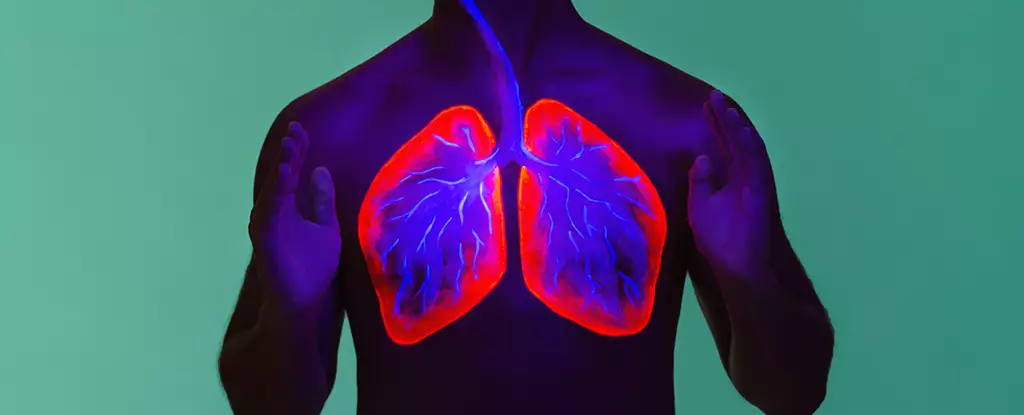For years, public health campaigns have predominantly focused on lifestyle choices like smoking and air pollution as the primary culprits of lung cancer. However, groundbreaking research from the University of Florida and the University of Kentucky has sparked a paradigm shift, suggesting that the foods we eat might also significantly influence our risk of developing this devastating disease. This new finding prompts us to reconsider our relationship with food and its broader implications on our health and well-being.
The Role of Glycogen in Cancer Growth
At the heart of this emerging conversation is a small but mighty molecule known as glycogen. Traditionally recognized as the body’s storage form of glucose—a primary energy source—glycogen has now been implicated as a potential catalyst for lung adenocarcinoma, a type of lung cancer responsible for a staggering 40% of cases worldwide. Research has revealed that elevated glycogen levels are found in human tissue samples of lung adenocarcinoma, implying a direct connection between this energy reserve and cancer proliferation.
The implications of this discovery are profound. In animal studies, researchers found that a diet rich in carbohydrates resulted in increased glycogen levels, subsequently accelerating tumor growth in mice. Conversely, when glycogen levels were diminished, tumor growth slowed—a finding that raises critical questions about the role of diet in cancer development. This piece of research reveals how the body’s metabolic processes can inadvertently nourish cancer cells, providing them with an essential fuel that empowers their relentless growth.
Spatial Metabolomics: A Novel Technique
The research team’s use of cutting-edge spatial metabolomics—a technique that enables the analysis of small molecules within their tissue context—has opened a new frontier in cancer research. This method offers scientists a detailed view of molecular behaviors and interactions as they occur within their natural environment, uncovering hidden patterns that were previously difficult to discern. As molecular biologist Ramon Sun from the University of Florida notes, this approach allows researchers to visualize diseases in remarkable detail, ultimately guiding future studies in cancer prevention.
While this innovative technique holds promise for unveiling more insights into cancer’s biochemical pathways, its use in establishing a firm link between diet and lung cancer requires ongoing research. Still, the findings thus far indicate that our eating habits, particularly those typical of a Western-style diet heavy in fats and carbohydrates, may need serious reevaluation.
Dietary Choices: The Sweet Danger
Glycogen is a byproduct of our dietary choices; it accumulates as we consume high-carb foods. It’s undeniably unsettling to think that the very substances we turn to for energy could also fuel our bodies’ most malignant threats. For centuries, we’ve been aware that certain diets can increase our risk for various types of cancer. Yet, chronic conditions like lung cancer have largely escaped scrutiny in this context.
As research confirms the alarming association between glycogen and lung cancer, it raises significant public health concerns. Current dietary guidelines typically ignore the relationship between food and lung cancer, focusing instead on more conventional risk factors. The study’s findings urge us to add lung cancer to the list of diseases potentially influenced by diet, alongside well-established connections to diseases like pancreatic and liver cancer.
Implications for Public Health
The findings also stress the need for a collective shift towards emphasizing dietary education and policy changes aimed at promoting healthier food choices. Just as anti-smoking campaigns reshaped public perceptions about lung cancer, a similar concerted effort regarding diet could play a crucial role in disease prevention. Education on the importance of nutrition should become a fundamental aspect of any comprehensive cancer prevention strategy, enabling individuals to understand how their daily food choices can impact their long-term health outcomes.
Ramon Sun’s insights point toward a future where lung cancer is no longer viewed solely through the lens of environmental factors but as a multifaceted issue intricately tied to our diets. It serves as a potent reminder that while we’ve made strides in reducing smoking rates and pollution, our dietary habits must also come under scrutiny.
As the scientific community continues to uncover the complexities of cancer, it’s crucial for each of us to engage in a proactive dialogue about our dietary choices. Adopting a healthier lifestyle not only supports our personal health but contributes to a broader cultural shift where prevention becomes a priority rather than a reactive measure in the face of disease.


Leave a Reply